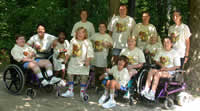Staff
Often the most important resources at a camp in terms of insuring the quality of your child’s experience are the staff. Many camp directors report that when talking with families their biggest question is “Who will be caring for my child in my absence and how will they insure my child stays safe?” Do not hesitate to ask questions about the people who will ultimately be responsible for the care of your son or daughter whether for a day at a time or several weeks at a time. ACA standards place significant emphasis on quality of staff, including pre-camp protocol, training, and evaluations.
- What are the desired qualities of your camp staff?
 Most camps will seek to find staff that are well rounded and fit the vision and mission of the camp. Qualities directors typically seek are “hard skills” such as past experience working with persons with disabilities or providing personal care for children and “soft skills” such as flexibility, creativity, willingness to learn, and patience. Both camp directors and camp staff should be able to state the camp’s vision, mission, and values. Camp directors should be able to tell you how they expect staff to enact these values with your children.
Most camps will seek to find staff that are well rounded and fit the vision and mission of the camp. Qualities directors typically seek are “hard skills” such as past experience working with persons with disabilities or providing personal care for children and “soft skills” such as flexibility, creativity, willingness to learn, and patience. Both camp directors and camp staff should be able to state the camp’s vision, mission, and values. Camp directors should be able to tell you how they expect staff to enact these values with your children.
Return to top- What is the minimum age requirement for staff members?
- While this tends to vary by camp, ACA standards recommend that all camp staff who work primarily with children with special needs be at least 18 years of age or older. They further recommend, that if under 18, staff be at least 16 years old and be at least 2 years older than the minors with whom they are working.
Return to top - What certifications are required of your staff?
 Certifications tend to vary by camp and by role. Some key certifications to look for include life-guarding certifications for waterfront and pool staff, archery training or documented experience for archery instructors, CPR/First Aid for waterfront personnel, certifications and qualifications for medical staff, and certifications or documented qualifications for any other types of specialized activities or services. ACA defines “Specialized Activities” as: 1) The activity utilizes equipment, animals, or tools whose use by campers requires supervision by a person trained in their use. 2) The activity involves camper use of fire or camper use of heat producing equipment or substances (such as kilns). 3) The activity requires injury protection equipment such as helmets, goggles, or padding.
Certifications tend to vary by camp and by role. Some key certifications to look for include life-guarding certifications for waterfront and pool staff, archery training or documented experience for archery instructors, CPR/First Aid for waterfront personnel, certifications and qualifications for medical staff, and certifications or documented qualifications for any other types of specialized activities or services. ACA defines “Specialized Activities” as: 1) The activity utilizes equipment, animals, or tools whose use by campers requires supervision by a person trained in their use. 2) The activity involves camper use of fire or camper use of heat producing equipment or substances (such as kilns). 3) The activity requires injury protection equipment such as helmets, goggles, or padding.In regards to the care of children with special needs and chronic illnesses, it is also recommended you ask the director how staff are trained in topics such as disability awareness, adaptive programming techniques (where applicable), camper care, and “sensitive issues” such as toileting or other personal needs.
Return to top- What is the application process for staff?
- The application process for camp directors and staff should be an extremely thorough process and should include the following: submittal of an application or resume, references verified, background checks and personal interviews being conducted either in person or by phone. Do not hesitate to ask directors about this process as they should be more than happy to share it with you.
Return to top - What is your background?
Just as you should not be afraid to ask the director about qualifications of his or her staff, do not hesitate to ask about his or her background. You should feel comfortable inquiring about the camp director’s field of study, degrees, number of years experience serving particular populations, number of years at this camp, and so forth. The American Camping Association recommends that directors have the following qualifications in place:
- A Bachelors degree or appropriate professional certifications
- At least two prior seasons of administrative or supervisory experience in an organized camp
- Be at least 25 years old
- If a camp serving primarily children with special needs has at least 24 weeks of experience working with that population
- Do you perform background checks on your staff?
- While this may have been touched upon when you inquired about hiring practices, this is an important question to ask. Conducting background checks on staff has become a standard of practice in the field of organized camping.
Return to top - What training does your staff go through and who conducts the trainings?
- This too may have been addressed when you inquired about hiring practices, but take the time to find out how the staff who will ultimately be responsible for your children are trained. Find out how the training ties back to the vision, mission, and values of the camp. Also ask about the length and nature of the training program. ACA recommends that day camp staff receive at least 24 hours training; and resident, trip and travel camp staff receive at least 6 days training for long term staff and 24 hours training for short term staff.
Return to top - What if the camp staff cannot make the training? Do you have “late-hire” training?
 With colleges and universities now operating year-round, it can often be difficult for camps to hire one group of staff from beginning to end of the season. Many wonderful and highly qualified people want to join the camp staff after the typical training sessions have already been conducted. This can be a highly successful and safe opportunity for all involved but only if late hire trainings are in place and conducted properly through orientations, mentoring, and evaluative follow-ups.
With colleges and universities now operating year-round, it can often be difficult for camps to hire one group of staff from beginning to end of the season. Many wonderful and highly qualified people want to join the camp staff after the typical training sessions have already been conducted. This can be a highly successful and safe opportunity for all involved but only if late hire trainings are in place and conducted properly through orientations, mentoring, and evaluative follow-ups.
Return to top- What is your camp’s staff to camper ratio?
Staff to camper ratios tend to be highly situational and adapted based upon camper needs, environment of the camp, day or resident and on-site/off-site. However, this is a good topic to address with a director. Be honest about your child’s needs. Not being completely upfront about what he or she needs to be successful may have your child placed inadvertently in an unsafe situation. The camp then has the obligation to be honest in return. For example if your child wanders extensively and needs one-to-one support, be up front about this. It is only with open, honest dialog that the child can be placed in a camp setting that is the best “fit” for him or her. Camps should also have clearly stated eligibility requirements which can also help you assess whether or not this camp, and its stated staff to camper ratios will be an appropriate program for your child.
ACA recommends that when the camp serves campers with special physical, medical, and behavioral needs who require additional staff support to participate in camp, the following ratios of staff and counselor-support personnel to campers are suggested:
Return to topStaff-to-camper ratios Camper Description Staff Camper Needing constant and individual assistance or supervision 1 1 Needing close, but not constant assistance or supervision 1 2 Needing occasional assistance 1 3 Needing minimal assistance 1 3 - How is camp staff trained for emergency situations?
Due to the fact that most camp experiences occur outside, the opportunity for emergency situations always exist due to ever changing variables and difficulty controlling all of these variables. While tornadoes and severe thunderstorms cannot be prevented, staff can be properly trained to insure effective reaction to inclimate weather and other situations. Ask the director how these procedures are documented, trained, and evaluated with their staff.
If you are selecting an overnight camp, also consider asking the Director:
Return to top- How are cabins staffed at night?
- Children with disabilities and special medical concerns have needs on a
24/7 basis. If your child is attending a residential camp ask the director how these needs are met throughout the night. Specifically find out how many staff are required to be in the cabin during the nighttime hours, find out if they stay awake all night or if they are allowed to sleep and meet your child’s needs on an “on-call” basis.
Return to top
